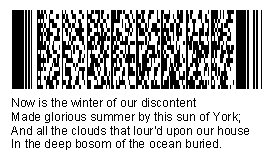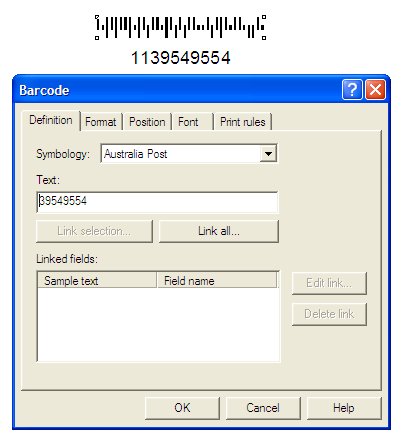| Design and Objects |

|

|
| |
| Objects |

|

|
 |
 |

|

|

|
 |
 |
 |
 |

|
 |
| |
| Page
Elements |
 |

|

|
|
| Creating Objects |
 |
|
|
| EAN/UPC-128 Barcode |
(Please open “EAN-128” while looking at this document, EAN-128 uses two
different barcode generation methods in the “left” label and the
“right” label).
SSCC labels contain two barcodes that together use 5 data fields, four
of which are contained in the bottom barcode. The contents of
this barcode are common for major retailers, and include the AI’s for
(02) Item, (15) Best Before Date, (10) Lot or Batch Number and
(37)
Quantity.
The production system recognizes each AI and checks the data to confirm
it is the correct type and length. Illegal barcodes are not
printed. If you have problems building a correct barcode,
please build one AI at a time until the entire barcode is built and
correct. The program independently compresses any resulting
numeric digits where more than 4 adjacent digits are found, and prints
the delimiters in brackets as the Human Readable.
More complex AIs can be added to the barcode such as 310n which shows
the trade weight in Kg for a Pallet. This contains the number
of decimals in the “n” position, hence:
| (3102)1225 |
= 12.25 Kg |
| (3101)1225 |
= 122.5 Kg |
| (3100)1225 |
= 1225 Kg |
You will REQUIRE the local publication from the EAN/UPC body in your
country, who will verify the barcodes for you where you want to use
additional AIs.
There are two basic schemes for production of EAN-128
barcodes.
- Construction from a single field
containing the full EAN-128 data. The fields can be either
fixed length or delimited. The labels named Delimited use
this approach, with delimited data.
Construction
of the barcode is very simple (just the one field), with construction
of the data file requiring AIs, and delimiters if the AI data is not
full length. For simplicity, use delimiters throughout – even
for fixed fields. No overhead is incurred in the finished
label.
We recommend placing the additional field containing EAN-128 data last
in the data record.
- Construction from individual
fields. In this approach the AIs
are inserted ahead of the individual fields. Fields must be
delimited for variable data that is short, and masked where required.
Construction
of the barcode is
moderately difficult, however data files are simple to generate and
contain just the data from your data base or from a FormTrap Associated
File.
Delimited
Labels:
The “delimited” approach, precedes each
AI with a delimiter (~) and the entire text ends in a trailing
delimiter.
Working through the barcode text:
| Delimiter |
~ (any character, such as / or \ or |
etc.) |
| AI 02 (item) |
Item data |
|
Key a valid representation of your
Item code
link this to the Item
field in your file |
|
|
| Delimiter |
~ |
| AI 15 (Use by date) |
Best Before date |
| Best Before |
Key in a valid date in yymmdd format
(example uses 051231)
link this to the Best
Before field in your file |
|
|
| Delimiter |
~ |
| AI 10 (Batch or Lot) |
Lot data |
|
Key in an example batch number for
your site
link this to the Lot field
in your file |
|
|
| Delimiter |
~ |
| AI 37 (Quantity) |
Quantity data |
|
Key some data, the maximum for your
trade units
link this to the Quantity
field in your file |
|
|
| Delimiter |
~ |
In this label, the data in the "Delimited" file is already reduced to
significant digits only.
Fixed
Labels:
The
label uses fixed length fields output by your application (fields
are space separated in the data file for easy viewing). The
barcode inserts AI and delimiter (/) where required. This type
of
file is normally presented by AS/400 programs as well as some Unix
systems. In this sample, variable length AI text is of the
required size (6 characters for Lot and 4 characters for Qty).
Working through the text:
| AI 02 (Item) |
Item data |
|
Key a valid representation of your
Item code
link this to the Item
field in your file
this field is fixed length
field uses a Mod 10 Check Digit which is checked |
|
|
| AI 15 (Use by date) |
Best Before date |
|
Key in a valid date in yymmdd format
(example uses 091231)
link this to the Best
Before field in your file |
|
|
| Delimiter |
/ (Lot is variable length, max. 20
characters) |
| AI 10 (Batch or Lot) |
Lot data |
|
key in 6 digits (or the number of
characters in your Lot number),
link this to the Lot
field in your file |
|
|
| Delimiter |
/ (Quantity is variable length, max.
8 digits) |
| AI 37 (Quantity) |
Quantity data |
|
key 4 digits (or whatever your
organization's standard length is)
for the pieces in your trade unit,
link this to the Quantity
field in your file |
|
|
| Delimiter |
~ |
|
|
| Top
|
| PDF417 Barcode |
PDF417 barcodes are two-dimensional and have additional properties that
are easily included into the object by masking additional data onto the
front of the text string that will be converted into the PDF417
barcode. These properties are the Number of Data Character Columns, and
the Security (used to assist reading of a damaged or obscured barcode).
The defaults are 8 data columns, and a security level of 3 (security
runs from 1-lowest to 8-highest and impacts the finished size of the
barcode. For this application, the default security level is more than
adequate).
To change Data Columns and/or Security, mask this string to the front
of the barcode text:
~C~S~
where C is Columns and S is Security.
~C~~
Security may be omitted (and defaults to 3).
This is the definition string and resulting barcode.

|
|
| Top
|
| Australia Post DPID |
This barcode uses the DPID value to generate a barcode to Australia
Post specification. The value MUST include a check digit, the picture
shows a valid value.

|
|
| Top
|
|
|
|


